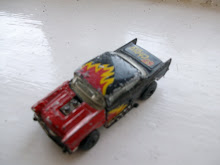Despite thinking of myself as a big Manchester United fan, I'd never got round to reading A Strange Kind of Glory, journalist Eamon Dunphy's biography of Matt Busby, first released in 1991, despite the praise from many other supporters of it being "essential reading".
To be honest, I'd long regarded Dunphy as a bit of a gobshite from his appearances on Irish TV, where he always seemed to be slagging something or someone off, albeit often with justification. I had particularly enjoyed his slating of the United team before a European game against Roma in 2007. Stating Roma were a better class and dismissing United's chances, he was left looking a bit daft by the 7-1 result.
I'd also not been too impressed with his ghostwriting of Roy Keane's somewhat tedious autobiography, but when I caught sight of his Busby book at a friend's house last Sunday, it seemed harmless enough to take a look. A good move.
Dunphy was perhaps better placed than most journalists to write such a work. A professional footballer himself, good enough to play over 20 times for the Republic of Ireland, he'd started out as a youngster at Manchester United, though never making the first team. His own first hand experience of the goings on at the club give backing to the claims that some of his colleagues conspired to fix matches in the early 60s, an allegation new to me.
In terms of Busby, Dunphy does a sound job of explaining the man in the context of his background and upbringing. A Scottish Catholic, of Irish heritage, at a time of great sectarian prejudice, Busby seems to rise above it through the influence of his mother (his father being a victim of the First World War) and the freedom of the football pitch, on which he excelled and enabled him to escape a life down the coal mine when he signed for Manchester City as a 17 year old.
A point is made of young Matt's close relationship with his maternal grandfather, an Irishman and something of a lovable rogue. Dunphy suggests that the generally strait-laced Busby (whose only true vice would be gambling) enjoyed the company of such characters and would often less judgemental - hence his tolerance of the antics of George Best decades later.
The life of a footballer in the first half of the century is also laid out. Bound by a maximum wage and tied to clubs until they were no longer wanted or needed, players often ended up on the scrapheap. Billy Meredith, the legendary figure of both Manchester City and United, arguably the first superstar of English football, played till he was nearly 50 but still died with little to his name in 1958.
Busby also noted the limitations of the managers of the time. After serving as a PT instructor during the Second World War, he agreed to take the job as manager of Manchester United on the condition he had complete control of team affairs. Interfering directors were not to be tolerated. With a sympathetic chairman, he got his way. Recruiting Jimmy Murphy as his assistant, he set to work at rebuilding a club with little money, a bombed out ground and who hadn't won a trophy in over 30 years.
When the book reaches the 50s, and the origins of what become the "Busby Babes", it's great to read stories of young players like Bobby Charlton, Duncan Edwards and Wilf McGuinness spending evenings at the cinema or the skate rink. This is the romanticised side of the game back then - players doing it for love, crowds full of passionate local support etc etc. However, Dunphy also explains the world of illegal payments to parents by clubs to persuade them to let their son sign to them over rivals.
Even Busby himself is shown to be ruthless, intolerant of any dissent. Charlie Mitten and Johnny Morris, two vital cogs in the team of the late 1940s, are cast out when they step out of line with no mercy. Throughout his management, United - despite being the best supported and amongst the most successful team of the time - are paying star names well below what they would receive elsewhere.
The tales of the 50s team, enjoyable as they are, are tainted by the knowledge of what will happen next. The Munich Air Disaster is the obvious sharp turn from which the story changes. Busby changes, physically and mentally. No longer the tracksuit manager of before, he takes a more backstage role. Dunphy writes of personal experience of other players showing little or no respect for their manager, with the tide finally turning to the Hollywood ending of the 1968 European Cup triumph. Busby retired a year later.
But as every good United fan know, the story doesn't end there. The club went into steep decline afterwards, recruiting three managers in quick succession and suffering relegation in 1974. Jimmy Murphy, after years of 70 hour weeks, is cast aside with no reward. Busby, having spent years plotting for local businessman Louis Edwards to snare the chairman position - with the apparent agreement their sons would eventually take positions on the board - sees his choice renege on the promise. Edwards junior would later take control of the club and oversee the floatation on the stock market that some would argue has led to current problems.
A compelling book, the best praise I can give is that I read it at every possible moment, it surely is as essential reading as people will tell you for an insight into the man who made Manchester United what they are today. Betrayal, power, greed - sometimes real lives are more exciting than fiction.
Subscribe to:
Post Comments (Atom)

Well put. I'll order a copy now.
ReplyDeleteFor a fan's take I can warmly recommend Tom Clare's 'Forever a Babe'. There are excerpts on his website http://foreverababe.com/